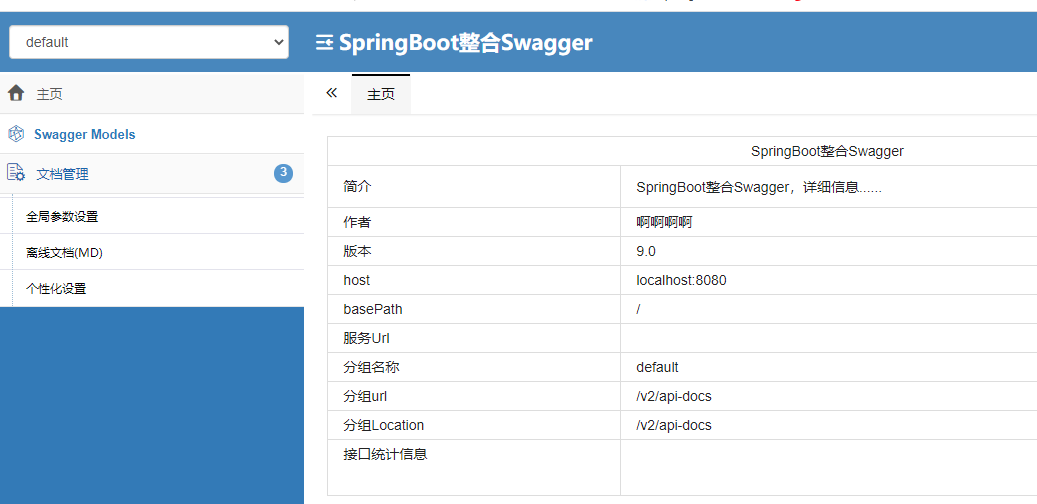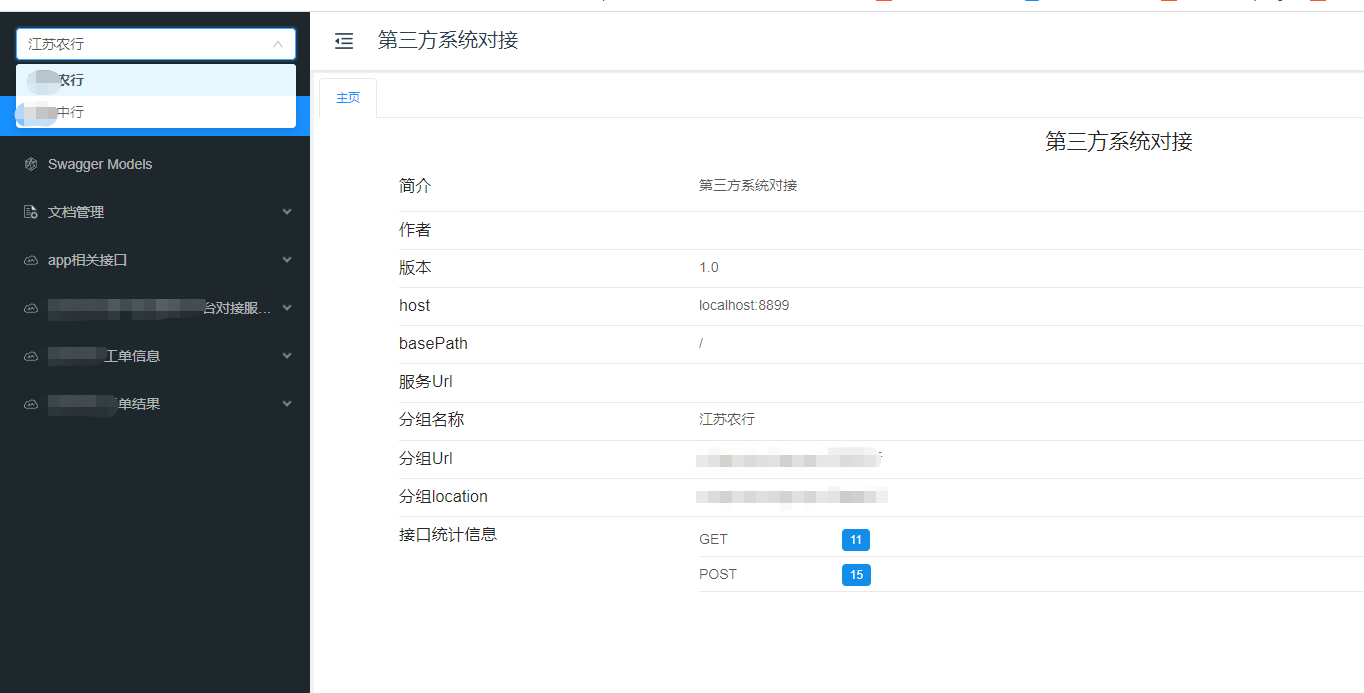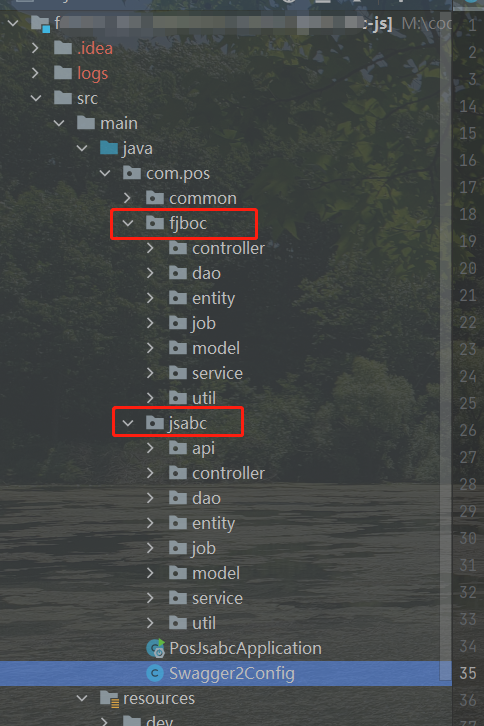springboot集成swagger
- 简介
随着前后端分离开发模式越来越流行,编写接口文档变成了开发人员非常头疼的事。而Swagger是一个规范且完整的web框架,用于生成、描述、调用可视化的RESTful风格的在线接口文档,并解决手写文档时编写和更新以及测试的复杂问题。 - pom文件引入jar包坐标
<dependency>
<groupId>io.springfox</groupId>
<artifactId>springfox-swagger2</artifactId>
<version>2.9.2</version>
</dependency>
<!-- swagger ui切换2 -->
<dependency>
<groupId>com.github.xiaoymin</groupId>
<artifactId>swagger-bootstrap-ui</artifactId>
<version>1.9.6</version>
</dependency>
<dependency>
<groupId>org.springframework.boot</groupId>
<artifactId>spring-boot-starter-web</artifactId>
</dependency>
<dependency>
<groupId>org.projectlombok</groupId>
<artifactId>lombok</artifactId>
<optional>true</optional>
</dependency>
- 创建Swagger2配置类
package com.swagger;
import org.springframework.context.annotation.Bean;
import org.springframework.context.annotation.Configuration;
import springfox.documentation.builders.ApiInfoBuilder;
import springfox.documentation.builders.PathSelectors;
import springfox.documentation.builders.RequestHandlerSelectors;
import springfox.documentation.service.Contact;
import springfox.documentation.spi.DocumentationType;
import springfox.documentation.spring.web.plugins.Docket;
import springfox.documentation.swagger2.annotations.EnableSwagger2;
@Configuration
@EnableSwagger2
public class SwaggerConfig {
@Bean
public Docket createRestApi() {
return new Docket(DocumentationType.SWAGGER_2)
.pathMapping("/")
.select()
.apis(RequestHandlerSelectors.basePackage("com.swagger.controller"))
.paths(PathSelectors.any())
.build().apiInfo(new ApiInfoBuilder()
.title("SpringBoot整合Swagger")
.description("这里是文档的简介")
.version("9.0")
.contact(new Contact("作者","blog.csdn.net","617536637@qq.com"))
.license("The Apache License")
.licenseUrl("http://www.baidu.com")
.build());
}
}
这里提供一个配置类,首先通过@EnableSwagger2注解启用Swagger2,然后配置一个Docket Bean,这个Bean中,配置映射路径和要扫描的接口的位置,在apiInfo中,主要配置一下Swagger2文档网站的信息,例如网站的title,网站的描述,联系人的信息,使用的协议等等
4. 访问swagger文档
http://localhost:8080/doc.html

5. 添加接口
package com.swagger.controller;
import java.util.List;
import org.springframework.web.bind.annotation.GetMapping;
import org.springframework.web.bind.annotation.PathVariable;
import org.springframework.web.bind.annotation.PostMapping;
import org.springframework.web.bind.annotation.PutMapping;
import org.springframework.web.bind.annotation.RequestBody;
import org.springframework.web.bind.annotation.RequestMapping;
import org.springframework.web.bind.annotation.RequestParam;
import org.springframework.web.bind.annotation.RestController;
import com.swagger.pojo.User;
import io.swagger.annotations.Api;
import io.swagger.annotations.ApiImplicitParam;
import io.swagger.annotations.ApiImplicitParams;
import io.swagger.annotations.ApiOperation;
@RestController
@Api(tags = "用户管理相关接口")
@RequestMapping("/user")
public class UserController {
@PostMapping("/")
@ApiOperation("添加用户的接口")
@ApiImplicitParams({
@ApiImplicitParam(name = "username", value = "用户名", defaultValue = "李四"),
@ApiImplicitParam(name = "address", value = "用户地址", defaultValue = "深圳", required = true)
})
public User addUser(String username, @RequestParam(required = true) String address) {
return new User();
}
@GetMapping("/")
@ApiOperation("根据id查询用户的接口")
@ApiImplicitParam(name = "id", value = "用户id", defaultValue = "99", required = true)
public User getUserById(@PathVariable Integer id) {
User user = new User();
user.setId(id);
return user;
}
@PutMapping("/{id}")
@ApiOperation("根据id更新用户的接口")
public User updateUserById(@RequestBody User user) {
return user;
}
}
这里边涉及到多个API,我来向小伙伴们分别说明:
1. @Api注解可以用来标记当前Controller的功能。
2. @ApiOperation注解用来标记一个方法的作用。
3. @ApiImplicitParam注解用来描述一个参数,可以配置参数的中文含义,也可以给参数设置默认值,这样在接口测试的时候可以避免手动输入
4. 如果有多个参数,则需要使用多个@ApiImplicitParam注解来描述,多个@ApiImplicitParam注解需要放在一个@ApiImplicitParams注解中。
5. 需要注意的是,@ApiImplicitParam注解中虽然可以指定参数是必填的,但是却不能代替@RequestParam(required = true),前者的必填只是在Swagger2框架内必
填,抛弃了Swagger2,这个限制就没用了,所以假如开发者需要指定一个参数必填,@RequestParam(required = true)注解还是不能省略
6. 如果参数是一个对象(例如上文的更新接口),对于参数的描述也可以放在实体类中。例如下面一段代码:
package com.swagger.pojo;
import io.swagger.annotations.ApiModel;
import io.swagger.annotations.ApiModelProperty;
import lombok.Data;
@ApiModel
@Data
public class User {
@ApiModelProperty(value = "用户id")
private Integer id;
@ApiModelProperty(value = "用户名")
private String username;
@ApiModelProperty(value = "用户地址")
private String address;
}
好了,经过如上配置之后,接下来,刷新刚刚打开的页面,可以看到如下效果

6. 在Security中的配置
如果我们的Spring Boot项目中集成了Spring Security,那么如果不做额外配置,Swagger2文档可能会被拦截,此时只需要在Spring Security的配置类中重写configure方法,添加如下过滤即可:
@Override
public void configure(WebSecurity web) throws Exception {
web.ignoring()
.antMatchers("/doc.html")
.antMatchers("/v2/**")
.antMatchers("/swagger-resources/**");
}
- 后期添加多个项目切换
多个模块文档进行切换类似下图

首先创建两个模块的包,结构类型下图

然后修改配置文件
import io.swagger.annotations.ApiOperation;
import org.springframework.context.annotation.Bean;
import org.springframework.context.annotation.Configuration;
import springfox.documentation.builders.ApiInfoBuilder;
import springfox.documentation.builders.PathSelectors;
import springfox.documentation.builders.RequestHandlerSelectors;
import springfox.documentation.service.ApiInfo;
import springfox.documentation.spi.DocumentationType;
import springfox.documentation.spring.web.plugins.Docket;
import springfox.documentation.swagger2.annotations.EnableSwagger2;
@Configuration
@EnableSwagger2
public class Swagger2Config {
@Bean
public Docket jsAbcApi(){
return new Docket(DocumentationType.SWAGGER_2)
.apiInfo(getApiInfo())
.groupName("农行")
.select()
.apis(RequestHandlerSelectors.basePackage("com.pos.jsabc"))
//.apis(RequestHandlerSelectors.withMethodAnnotation(ApiOperation.class))
.paths(PathSelectors.any())
.build();
}
@Bean
public Docket fjBocApi(){
return new Docket(DocumentationType.SWAGGER_2)
.apiInfo(getApiInfo())
.groupName("中行")
.select()
.apis(RequestHandlerSelectors.basePackage("com.pos.fjboc"))
.paths(PathSelectors.any())
.build();
}
private ApiInfo getApiInfo(){
return new ApiInfoBuilder()
.title("第三方系统对接")
.description("第三方系统对接")
.version("1.0")
.license("Apache 2.0")
.licenseUrl("http://www.apache.org/licenses/LICENSE-2.0")
.build();
}
}


 浙公网安备 33010602011771号
浙公网安备 33010602011771号